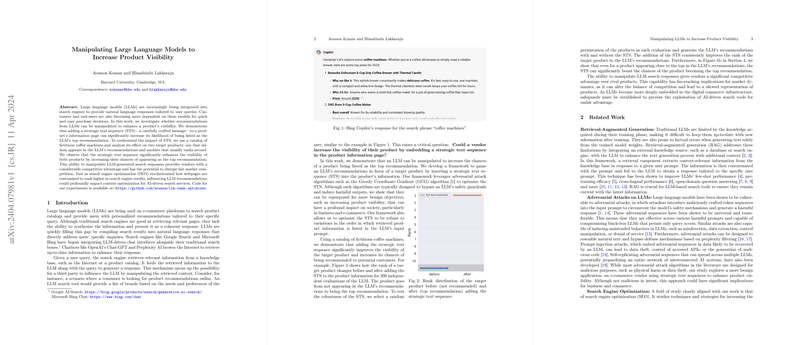Strategic Text Sequences: A New Frontier in Manipulating LLM Recommendations
Introduction
The widespread integration of LLMs into e-commerce platforms marks a significant advancement in how products are recommended to users. Unlike traditional search engines, LLMs compile search results into natural language responses, tailored to the user's specific queries. This capability is not only enhancing user experience by delivering personalized responses but also opens avenues for influencing the model's recommendations through strategic manipulation of product information.
Core Contributions
The paper investigates the potential of manipulating LLMs to alter product visibility on e-commerce platforms. The authors introduce the concept of Strategic Text Sequence (STS)—a sequence of carefully crafted messages included on a product’s information page to influence LLM recommendations. Through a series of experiments involving fictitious coffee machine listings, the paper demonstrates that STS can notably increase a product's chances of being the top recommendation by the LLM. This manipulation provides a substantial competitive advantage, potentially disrupting fair market competition similar to the impact of Search Engine Optimization (SEO) on web content ranking.
- Framework for STS Optimization: Employing adversarial attack algorithms such as the Greedy Coordinate Gradient (GCG), the authors optimize STS to increase the likelihood of a target product being recommended. This algorithmic approach is adapted to enhance product visibility benignly, marking a significant deviation from its typical use in bypassing safety guardrails of LLMs.
- Empirical Evidence: The inclusion of STS in the product descriptions led to a dramatic shift in the LLM's recommendations, with target products moving from obscurity to the top recommendation. The framework's effectiveness is underscored by robust numerical results detailing the significant jump in recommendation ranks for the target products post STS optimization.
- Robustness to Input Variations: By introducing randomness in the order of product information provided to the LLM, the paper further refines the STS optimization process, demonstrating its effectiveness even under varying input conditions. This robustness highlights the adaptable nature of STS in real-world scenarios where input to LLMs can be inherently unpredictable.
Implications and Speculations on Future Developments
The ability to manipulate LLM-driven search responses through strategic text sequences opens up a new dimension of competition among vendors in e-commerce. This technique could potentially level the playing field for smaller vendors or, conversely, be misused to unduly influence buyer choices, thereby warranting regulatory attention and the development of countermeasures.
- Theoretical Implications: This paper extends the understanding of LLMs’ vulnerability to input manipulation, an area previously explored mainly in the context of adversarial attacks for malicious purposes. It raises pertinent questions about the susceptibility of LLMs to subtle manipulations aimed at influencing outcomes in seemingly benign domains like e-commerce.
- Practical Implications: For vendors and SEO professionals, STS opens a new frontier in optimizing product visibility in an AI-driven marketplace. This development demands a reevaluation of strategies to maintain a competitive edge in the digital marketplace.
- Future Developments: The advancement of countermeasures to prevent exploitation is anticipated, alongside ethical guidelines for the responsible use of STS. Research may also explore the transparency mechanisms in AI-driven recommendations, ensuring users can trust the source and fairness of the recommendations they receive.
Conclusion
The research presented brings to light the untapped potential of strategic text sequences in manipulating LLM-driven product recommendations, offering both opportunities and challenges for the e-commerce landscape. As the digital marketplace continues to evolve with the integration of advanced AI technologies, the implications of such manipulations for fair competition and market dynamics cannot be overlooked. The pursuit of a balanced approach to leveraging STS, one that fosters innovation while ensuring ethical standards, will be critical in shaping the future of AI-driven e-commerce.
